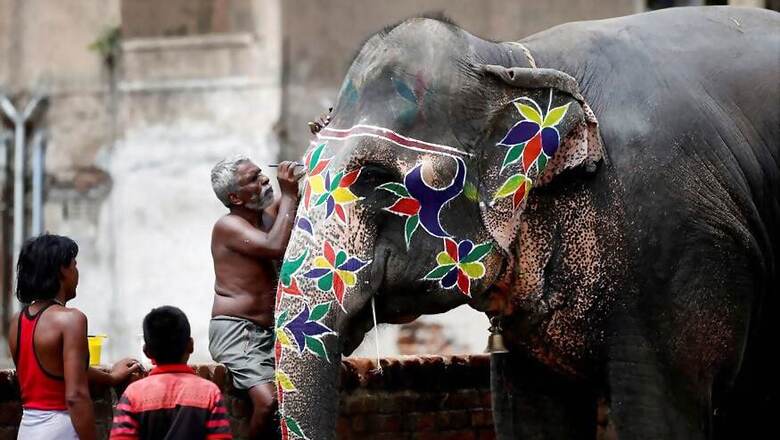
views
Guwahati: Rupsingh and Rani are among four elephants from Assam set to undergo a perilous journey to Ahmedabad for the annual Rath Yatra festival at the Jagannath temple on July 4.
However, wildlife activists from the state and other parts of the country are planning to move the Supreme Court against the flouting of a ban on elephant trade by the Assam government and allowing the transport of the jumbos to Gujarat. At a time when temperatures are touching 40 degrees and above in north India, the Assam forest department granted permission to send the elephants to Ahmedabad by train, traversing a distance of 3,100 km from Assam’s Tinsukia district. The order was signed by Chief Wildlife Warden and Principal Chief Conservator of Forest (wildlife) Ranjana Gupta.
The Northeast Frontier Railway (NFR) authorities in Tinsukia are said to be looking for a special wagon to transport the pachyderms, while following necessary transportation rules in the case of large animals. While the railways will only be responsible for the elephants till they are in transit, it is the duty of the Assam forest department to ensure that they are looked after properly in the carriage from the time they are booked till the time they are delivered at the destination.
Sources in the state forest department said no specialised wildlife veterinarian was willing to accompany the elephants and the authorities were trying to get a local vet to travel to Ahmedabad. A report in nenow.in said that while forest officials were insisting on transporting the elephants on a passenger train, the railway authorities expressed concern that the jumbos may not be able to cope up with the speed of a fast-moving train running at 100km per hour after crossing Katihar in Bihar.
Ranjan Kumar Das, Conservator of Forest (Eastern Assam circle), who is looking after the entire process of transporting the elephants, did not respond to the attempts by News18 to connect over the issue. There are also reports that claimed that two of the four elephants being sent to Gujarat were not captive-born, but were caught from the wild and domesticated.
Experts said the Wildlife (Protection) Act, 1972 (WLPA) had strict rules when it came to capturing of wild animals, which it defined as ‘hunting’ (Section 2(16) of the WLPA). As a Schedule I animal, Section 9 of the WLPA prohibites the capture of elephants from the wild. Capturing of wild elephants is allowed in limited circumstances by Section 11 and 12 of the Act.
However, as a Schedule I animal, any capture of an elephant for specific purpose requires the permission of the Central Government. Unless all conditions are satisfied, the capture of an elephant is illegal and a non-compoundable offence punishable with three-seven years imprisonment and a fine of not less than Rs 10,000. According to Section 43(1) of the WLPA, no person having in his control or possession a captive animal in respect of which he has a certificate of ownership shall transfer such captive animal by any mode of consideration of commercial nature.
Further, if the elephants are being transferred to Ahmedabad by way of lease and if there is any sum of money or other consideration involved in the transfer, it would be in violation of Section 43 of the WLPA. However, in this case, ownership certificates for the two elephants have reportedly been issued to ease the process of their transportation to Ahmedabad.
“If elephants are captured from the wild illegally, the state forest department does not, in my opinion, have the power to regularise such illegality by microchipping them and issuing ownership certificates,” said a Guwahati-based animal rights activist on the condition of anonymity, adding that a few of them were going to move the apex court for violation of its May 2016 order.
By its order in the case of Wildlife Rescue and Rehabilitation Centre & Others vs Union of India and Others, the Supreme Court had stated that that the state government shall not issue any ownership certificate to any of the persons in possession of elephants. That apart, the persons who are in possession of elephants shall not transfer the elephants outside the state nor shall they part with the elephants by way of transfer in any manner. The above order was issued with reference to a notification issued by Kerala, in which the state of Assam was also a respondent.
“Since the issue is substantially similar, it can be said that the direction applies to the government of Assam, as well. It should be raised with the government highlighting the fact that its actions are not in consonance with the Supreme Court order and stands the possible risk of contempt of court,” added the wildlife activist.
Speaking to News 18, honorary wildlife warden Kaushik Baruah questioned the need to transport elephants in extreme weather conditions. He said, “If at all the elephants need to be transported, then why in this weather? North and west are experiencing a heatwave and transporting elephants to these places at the moment is nothing but cruelty... Elephants have been banned from performing in circuses, zoos have been asked not to exhibit them. Then, why this leniency for temple elephants? We worship Ganesha, the Elephant God. Why are the Gods being put through such stress and cruelty then?”
Reports said the elephants would be sent for six months. A large number of jumbos from Arunachal Pradesh and Assam were leased to temples in Kerala, Gujarat and other states, but none returned to their original owners. Earlier, there have been several instances and complaints on illegal trading of elephants from forests in Assam and elephants transported to temples in south India living under pathetic conditions. Sources said an owner was paid Rs 10-12 lakh for an elephant and a separate amount is paid to the broker.
Of the four pachyderms being sent to Ahmedabad, two including Rupsingh is owned by Piyal Moran of Lakhipathar under Digboi forest division, and one each by Maheswari Moran under Doomdooma forest division and Joginath Pegu who owns one of the female elephants, Rani, under Dibrugarh forest division.
The elephants at the Jagannath temple would be decorated and paraded at the Rath Yatra that coincides with the famed annual Rath Yatra in Puri. Sources said the Jagannath temple in Ahmedabad had 13 elephants, most of whom were from the northeast. According to traditions, the elephants have the first glimpse of Jagannath, his brother Balabhadra and sister Subhadra, and lead the procession through different parts of the city covering a distance of about 14km.













Comments
0 comment